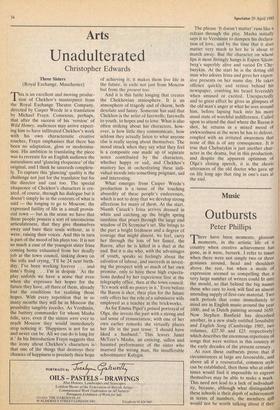Arts
Unadulterated
Christopher Edwards
Three Sisters (Royal Exchange, Manchester) rr his is an excellent and moving produc- tion of Chekhov's masterpiece from the Royal Exchange Theatre Company, directed by Casper Wrede in a translation by Michael Frayn. Conscious, perhaps, that after the success of his 'version' of Wild Honey, audiences may arrive expect- ing him to have infiltrated Chekhov's work with his own characteristic creative touches, Frayn emphasises that there has been no adaptation, gloss or modernisa- tion. His ambition in translating the piece was to recreate for an English audience the naturalness and 'glancing eloquence' of the original, and I think he succeeds complete- ly. To capture this 'glancing' quality is the challenge not just for the translator but for the director and cast too. The special eloquence of Chekhov's characters is cre- ated, of course, through his dialogue but it doesn't simply lie in the contents of what is said — the longing to go to Moscow, the expressed futility of life in a small provin- cial town — but in the sense we have that these people possess a sort of unconscious articulateness, that they give themselves away and bare their souls without, as it were, raising their voices. And this in turn is part of the mood of his plays too. It is not so much a case of the youngest sister Irina coming home exhausted from her deadly job at the town council, sinking down on the sofa and crying, 'I'll be 24 next birth- day, I've been working forever . . . and time's flying . . . I'm in despair.' As the play unfolds we have a sense that even when she expresses her hopes for the future they have, all three of them, already lost the conditions for realising those hopes. With every repetition that in so many months they will be in Moscow the possibility tangibly recedes. As Vershinin, the battery commander for whom Masha falls, says, even if the sisters were ever to reach Moscow they would immediately stop noticing it: 'Happiness is not for us and never can be. All we can do is long for it.' In his Introduction Frayn suggests that the irony about Chekhov's characters is that one of the things that destroys their chances of happiness is precisely their hope of achieving it; it makes them live life in the future, in exile not just from Moscow but from the' present too.
And it is this futile longing that creates the Chekhovian atmosphere. It is an atmosphere of tragedy and of charm, both desolate and funny. Someone has said that Chekhov is the artist of farewells; farewells to youth, to hopes and to love. What is also often striking about his characters, how- ever, is how little they communicate, how seldom they actually listen to what anyone else is really saying about themselves. The mood struck when they say what they feel 'is a composite one made up of separate notes contributed by the characters, whether happy or sad, and Chekhov's mastery lies in orchestrating these indi- vidual moods into something poignant, sad and interesting.
What emerges from Casper Wrede's production is a sense of the touching absurdity of these people's endeavours, which is not to deny that we develop strong affections for many of them. At the start, Niamh Cusack's Irina arrives dressed in white and catching up the bright spring sunshine that pours through the large end window of Di Seymour's set. She brings to the part a bright freshness and a degree of courage that might almost, we feel, carry her through the loss of her fiancé, the Baron, after he is killed in a duel at the end. But it is she who, with the advantages of youth, speaks so feelingly about the salvation of labour, and succeeds in invest- ing the prospect with so much of her own promise, only to have these high expecta- tions dashed by her experience first at the telegraphy office, then at the town council: 'It's work with no poetry in it.' Even before the Baron is shot, their plan for the future only offers her the role of'a submissive wife employed as a teacher at the brickworks.
As for Emma Piper's poised portrayal of Olga, she invests the part with a strong and sad sense of renunciation; with one of her own earlier remarks she virtually places her life in the past tense: 'I should have liked a husband.' This leaves Janet McTeer's Masha, an enticing, sullen and haunted performance of the sister who married the wrong man, the insufferable schoolmaster Kulygin. The phrase 'It doesn't matter' runs like a refrain through the play. Masha initially says it to Vershinin to dampen his declara- tion of love, and by the time that it does matter very much to her he is about to march away. But the character on whose lips it most fittingly hangs is Espen Sjkon- berg's superbly alive and varied Dr Che- butykin. At the start he is the doting old man who adores Irina and gives her expen- sive presents on her name day. He takes offence quickly and retires behind his newspaper, combing his beard feverishly when amused or excited. Unexpectedly and to great effect he gives us glimpses of the old man's anger at what he sees around him, before lapsing back into his more usual state of watchful indifference. Called upon to attend the duel where the Baron is shot, he returns in a mixed mood of awkwardness at the news he has to deliver, coupled with an irritated awareness that none of this is of any consequence. It is true that Chebutykin is just another char- acter in the drama, but in this production, and despite the apparent optimism of Olga's closing speech, it is the chorie utterances of the old doctor who gave up on life long ago that ring in one's ears at the end.














































 Previous page
Previous page